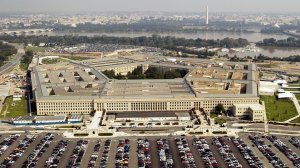A year after finding that military personnel were using government credit cards at places such as Larry Flynt’s Hustler Club, the Pentagon’s inspector general said this week that safeguards still haven’t been put in place to protect taxpayer dollars from being used for unauthorized expenses.

The IG office found last year that from July 2013 to June 2014, Pentagon personnel spent an unauthorized $952,258 at casinos. They dropped another $96,576 at places like Sapphire Gentleman’s Club, which advertises itself as the world’s largest strip club, “featuring 70,000 square feet of topless entertainment.”
At the time, the IG warned that beyond the abuse of taxpayer dollars, the use of the travel credit cards for personal expenses in gambling houses and strip bars created potential national security vulnerabilities — blackmail is a risk if military personnel take part in sexual impropriety or incur major debt.
Government travel card use is intended for official travel expenses only. The IG recommended steps to prevent abuse of the cards in casinos and strip bars in 2015. This week, it said, the Pentagon hadn’t taken those steps and the travel card program remains “vulnerable to continued misuse.”
The IG also found that:
— Pentagon management failed to perform reviews and responded inconsistently to cardholders’ improper charges.
— The Pentagon had less money for legitimate travel expenses as a result.
— Cardholders weren’t offered assistance for financial concerns or gambling addictions.
The Defense Department, the IG said, “experienced potential national security vulnerabilities” because it hasn’t dealt adequately with cardholders who may pose security concerns, “including extensive travel card misuse, questionable judgment, the decision not to follow rules and guidance, financial concerns, or gambling addictions,” the report said.
The IG report reveals some frustration with senior Pentagon officials, too, noting that one of them had seemingly dismissed the IG’s concerns by arguing that misuse in the 2015 report represented only .04% of total travel card spending.
The IG hit back in this latest report, saying that the 2015 audit didn’t allow their office to assess the total amount of personal use in the travel card program or evaluate its overall strength.
The Pentagon’s responses, the IG added, “attempt to minimize the potential risks presented by our findings, including the risk of security vulnerabilities by cardholders who misused travel cards.”
The Pentagon did not immediately respond to a request for comment.
The report comes at a time when the Defense Department is already under fire for inadequately screening personnel for behaviors that might pose national security risks.
Lawmakers are pointing to the Pentagon’s failure to discover that Maj. Gen. David Haight, a senior officer on the front lines of handling tensions with Russia, spent 10 years frequenting swingers clubs, engaging in group sex and carrying on an affair.
“More needs to be done to detect potential threats to national security secrets,” Missouri Sen. Claire McCaskill told CNN about Haight.”Too many cases in recent years have shown gaping holes in the process.”
The initial problems with military travel cards came to light because the law requires the IG at each Cabinet agency with more than $10 million in travel card spending to periodically review those programs.
At the time, the IG recommended simple steps to end the use of travel cards for unauthorized expenses, including setting up red flags if military personnel used cards while they weren’t on travel, if they went above per diems or if they had multiple declined authorizations.
Those steps would have helped officials spot some of the offenders the IG highlighted in its 2015 review. The IG office found a civilian employee at the Defense Logistics Agency had used his card 29 times in two years at Maryland Live! Casino. He made three attempts to withdraw $402 in cash with the card that were denied.
Another petty officer 1st class in the Navy spent $1,116 during 17 days of work travel at places like Red Parrot Gentlemen’s Club and Dreams Cabaret. His allotted budget for meals and incidentals on that trip was $151.50.
The IG also said the Pentagon could establish a policy to identify high-risk merchants or categories — a step that would quickly flag a vendor like “Vegas Showgirls,” which showed up in the 2015 investigation. And it could request that Citibank notify management officials of potential fraudulent or suspicious activity on accounts.
This year, once again, the inspector general called for the Defense Travel Management Office and program managers to improve oversight, toughen internal controls of the program and provide clear, written rules forbidding the use of travel cards at high-risk merchants.





